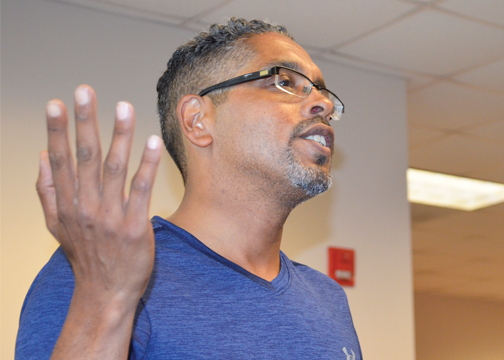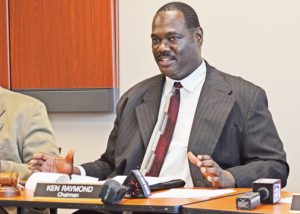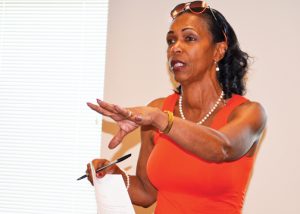BOE denies WSSU as early voting site again
Resident Carolyn Williams talks about how convenient the WSSU Anderson Center was to voters. N.C. Senator Paul Lowe advocated for a WSSU early voting site.
In a heated Friday meeting, the Forsyth County Board of Elections voted 2-1 for an early voting plan that once again didn’t include a site at Winston-Salem State University.
Fleming El-Amin, the sole Democrat on the BOE, was the single “no” vote during the July 15 meeting. He will submit a challenge to state board to once again make the Anderson Center on the campus of WSSU an early voting site.
“The public has made an outcry to us,” said Fleming. “I think it’s almost callous to ignore that.”
Before the vote, the public comment session was once again filled with residents asking for the site. Among them were professors and students from Wake Forest University. WFU student David Ajamy II, who’s spoken at several BOE meetings for the site, said he found the lack of consideration for it “disheartening” and felt his voice wasn’t being heard.
“It’s very obvious there’s suppression of votes,” he said. “It’s very obvious and I’m disgusted at the fact that Anderson is not a voting center.”
WSSU Student Jemma Johnson also expressed frustration, saying she felt the site was “vital” for voter accessibility.
“If black people and young people are an inconvenience for you, maybe you shouldn’t be on the board, and we shouldn’t have elections at all if you’re going to choose your own voters,” she said.
Resident Carolyn Williams said that Anderson Center was her preferred early voting site, and was convenient for the surrounding community.
“The only equality we have in America is our one vote,” she said. “I want you to please allow us to have our one vote.”
Political leaders also advocated for the site like Forsyth County Democratic Party Chair Eric Ellison.

Forsyth County Democratic Party Chair Eric Ellison was among the many who asked for WSSU early voting in last week’s meeting.
“You have an opportunity to listen to our community and to do what is right, make sure that our young people have an opportunity to cast their votes,” he said.
State Senator Paul Lowe, who represents the 32nd district that contains WSSU, said he hoped the board would listen to the outcry for the Anderson Center.
“I think it’s important to provide an opportunity for all of our citizens to vote,” said Lowe. “It seems like there’s an undercurrent to make things more difficult rather than making them easier.”
Freshman aren’t allowed to park on campus at WSSU, so an on-campus site solved issues they had with transportation to the polls. The Anderson Center acted as an early voting site from 2000-2012. After that, Republican Ken Raymond became BOE chair as boards of elections in the state – whose majorities are based on the party of the governor – became Republican dominated. Raymond publicly expressed concerns about Anderson Center, stemming from a 2010 incident there were he said a student told him she received class credit for voting. Raymond filed a complaint at the time, but was never able to find the instructor who allegedly did this. The BOE at the time unanimously found there was no violation since there was no allegation of anything being exchanged for voting for a particular party or candidate.
Raymond gave no reason for the Anderson Center’s current exclusion during the meeting. He did respond to commenters using terms like “voter suppression.”

Board of Elections Chair Ken Raymond responds to criticism from attendees during the meeting.
“That is absolutely ridiculous,” said Raymond. “Sites will be available for everyone throughout the county to have access to sites where they can go and vote.”
Stuart Russell said that in 2014 the board unanimously approved a plan he said was “good” and “balanced” without a WSSU site. He said he believed there were two early voting sites in the approved plan that are within a mile of WSSU that would give students access: the William Roscoe Anderson Jr. Community Center at Reynolds Park and the downtown BOE office.
According to Google maps, the community center is 1.2 miles away from the WSSU Anderson Center and is an additional 23 minute walk via Reynolds Park Road. The BOE is at least 1.6 miles from there and would be a 33-39 minute walk.
Another site that wasn’t included was Industries for the Blind, which Raymond said he objected to because BOE staff had expressed concerns if there was enough parking there. IFB asked to be a site because it would be convenient for the blind and visually impaired community that works and receives services there. Transportation to get to the polls can be an issue for those who are blind and visually impaired that rely on public transportation or friends and family to get from place to place. IFB is also on El-Amin’s plan he’ll be submitting to the state board along with Sunday voting, which was also not a part of the approved plan.

JoAnne Allen complains about what she says is the mishandling of her petition to run for mayor.
Also during the meeting, the BOE once again considered issues with JoAnne Allen’s petition to be an unaffiliated candidate for mayor. Allen needs 6,037 signatures by August 6 to get on the ballot. The petition, provided by the State BOE, requires signers to give their name, address, date of birth and signature. This information is then checked against voter registration records to make sure it matches, and that the person is a registered voter within the jurisdiction of that contest. Of 3,377 signatures that the BOE said it received from Allen, only 2,321 have met the criteria. Allen disputed 167 discounted names that she said she found registrations for, but the BOE staff only reversed its decision on 27 of them as of last week, with the vast majority still not counting.
Allen also said she’d turned in an additional 23 names, which she accused the BOE of losing. She said that BOE staff who have spent more than 200 man hours on the petition so far, were “incompetent” and had “no credibility.”









